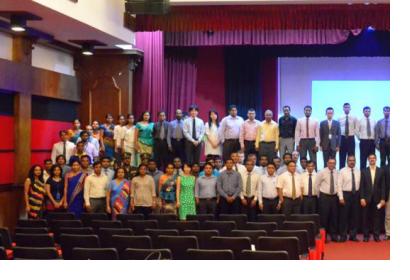As a follow up to the UN-SPIDER Technical Advisory Mission to Sri Lanka in 2011, a national workshop and training programme on “Earth Observation Technologies for Flood Risk Mapping, Modelling and Management” was held from 17 to 21 November 2014. The activity was jointly realised by UN-SPIDER, the International Water Management Institute (IWMI), the Disaster Management Centre (DMC) of the Ministry of Disaster Management (MoDM), and Postgraduate Institution of Science, University of Peradeniya.
The objective of the workshop and the training was to familiarise the participants with a broad array of methodologies and tools for flood hazard data collection, analysis and management, flood inundation modelling and rapid flood damage assessment, in the broader context of integrated flood management, multi-hazard risk assessment and flood risk management.
About 90 participants from national institutions, NGOs, and international organizations attended the workshop on 17 November 2014 and 22 participants attended the training programme from 18 to 21 November 2014. The training was supported by eight experts from the IWMI (Dr. Giriraj Amarnath, Mr. Yoshiaki Inada, Mr. Surajit Ghosh, Mr. Umer Ykob, Mr. Niranga Alahacoon), from the Vienna University of Technology (Mr. Stefan Schlaffer), from the National Disaster Center of China (Dr. Haixia He), and from UN-SPIDER (Dr. Shirish Ravan).
The training covered both theory and hands-on sessions on the following topics: earth observation for disaster management and, geo-data for disaster management including access to freely available data, rapid mapping, and the functioning of the International Charter: Space and Major Disasters, flood mapping using MODIS and SAR (ENVISAT ASAR), flood inundation modelling using the LISFLOOD-FP hydraulic model and the rainfall runoff inundation (RRI) model, and the rapid flood damage estimation model (RADAR). The content was designed based on operational programmes and case studies in Sri Lanka.

